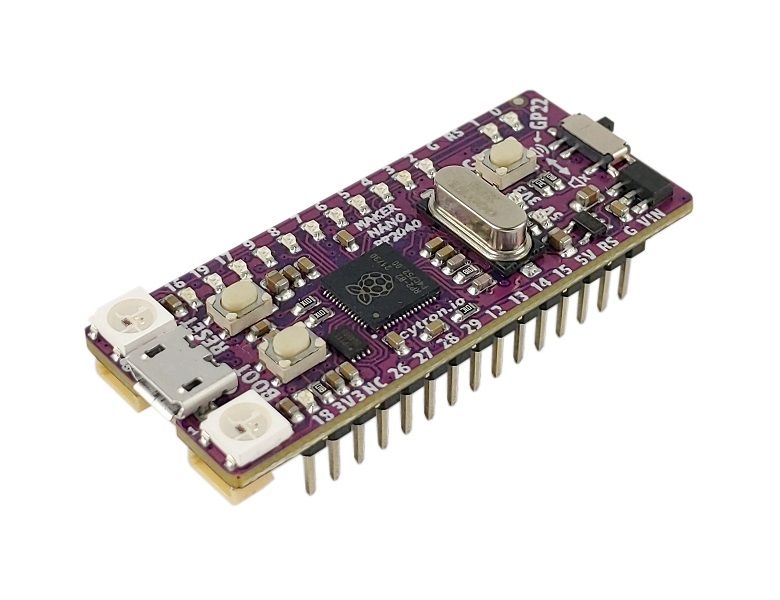Maker Nano RP2040
by Cytron Technologies

The Maker Nano RP2040 is a small but powerful MCU for your project. Same Arduino Nano form factor, but powered by a RP2040 MCU. This also means that it’s compatible with some of the daughter boards for Arduino Nano in the market. Not to forget it’s also breadboard friendly to allow building your own circuit.
The board has a lot of LEDs. Those LEDs are not just for a nice visual effect, they also represent the status of each pins. There are also two RGB LEDs (WS2812 Neopixel) to make your life more colorful. The onboard piezo buzzer and the sliding switch are additional hardware items which are present.
The Raspberry Pi RP2040 MCU can be programmed with C/C++ (natively or with Arduino IDE support), MicroPython or CircuitPython.
The I/O voltage is only 3.3 V and it’s not 5 V compatible.
Technical details
- Arduino Nano form factor
- Dual-core Arm Cortex-M0+ processor
- 264 KB internal RAM
- 2 MB of Flash memory
- 22x Digital I/O pins (4 ADC inputs
A0-A3) - 14x Status indicator LEDs for GPIOs
- 1x Piezo buzzer with mute switch
- 1x Push button
- 2x RGB LEDs (WS2812 Neopixel)
- 2x Maker Ports, compatible with Qwiic, STEMMA QT, Grove (via conversion cable)
- Support Arduino IDE, CircuitPython and MicroPython
Resources
Purchase
Contribute
Have some info to add for this board? Edit the source for this page here.
CircuitPython 9.2.1
This is the latest stable release of CircuitPython that will work with the Maker Nano RP2040.
Use this release if you are new to CircuitPython.
Built-in modules available: _asyncio, _bleio, _eve, _pixelmap, adafruit_bus_device, adafruit_pixelbuf, aesio, alarm, analogbufio, analogio, array, atexit, audiobusio, audiocore, audiomixer, audiomp3, audiopwmio, binascii, bitbangio, bitmapfilter, bitmaptools, bitops, board, builtins, builtins.pow3, busdisplay, busio, busio.SPI, busio.UART, codeop, collections, countio, digitalio, displayio, epaperdisplay, errno, floppyio, fontio, fourwire, framebufferio, getpass, gifio, hashlib, i2cdisplaybus, i2ctarget, imagecapture, io, jpegio, json, keypad, keypad.KeyMatrix, keypad.Keys, keypad.ShiftRegisterKeys, keypad_demux, keypad_demux.DemuxKeyMatrix, locale, math, memorymap, microcontroller, msgpack, neopixel_write, nvm, onewireio, os, os.getenv, paralleldisplaybus, pulseio, pwmio, qrio, rainbowio, random, re, rgbmatrix, rotaryio, rp2pio, rtc, sdcardio, select, sharpdisplay, storage, struct, supervisor, synthio, sys, terminalio, time, touchio, traceback, ulab, usb, usb_cdc, usb_hid, usb_host, usb_midi, usb_video, vectorio, warnings, watchdog, zlib
Included frozen(?) modules: neopixel, simpleio
Features: Speaker, STEMMA QT/QWIIC, Breadboard-Friendly
Absolute Newest
Every time we commit new code to CircuitPython we automatically build binaries for each board and language. The binaries are stored on Amazon S3, organized by board, and then by language. These releases are even newer than the development release listed above. Try them if you want the absolute latest and are feeling daring or want to see if a problem has been fixed.
Previous Versions of CircuitPython
All previous releases of CircuitPython are available for download from Amazon S3 through the button below. For very old releases, look in the OLD/ folder for each board. Release notes for each release are available at GitHub button below.
Older releases are useful for testing if you something appears to be broken in a newer release but used to work, or if you have older code that depends on features only available in an older release. Otherwise we recommend using the latest stable release.
